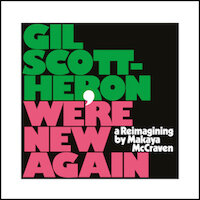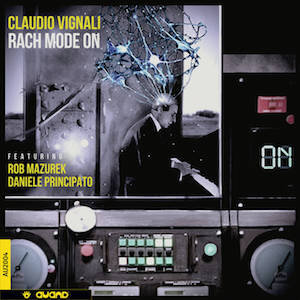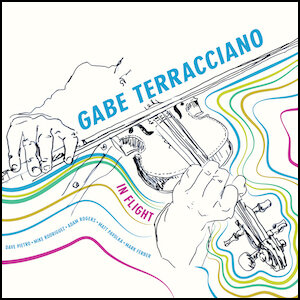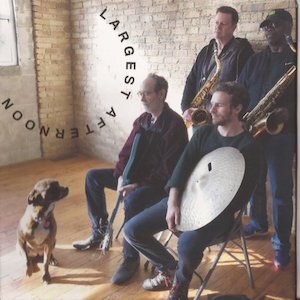GEOMETRY - GEOMETRY OF DISTANCE (Relative Pitch, 2019)
Personnel - Kyoko Kitamura: vocals; Taylor Ho Bynum: cornet; Joe Morris: guitar; Tomeka Reid: cello. .
Geometry, a quartet of committed improvisers, releases its sophomore album, Geometry of Distance, on the Relative Pitch label. The intricate synthesis of sound on this record is utterly experimental, expanding and contracting without previous warning. Cellist Tomeka Reid and guitarist Joe Morris work diligently on the quirky foundations, weaving atypical contrapuntal grids. In turn, idiosyncratic Japanese vocalist Kyoko Kitamura and American cornetist Taylor Ho Bynum contribute well-adjusted lines, sometimes freely, sometimes embedding their sounds in the surroundings. Atonal guitar chords can be heard on the session’s opener, “Space Chat”, which features Kitamura’s unintelligible language calmly communicated from another planet, and on “Magnificent Desolation”, which flows like a bitterly tragic operetta. This quieter posture contrasts with pieces like “Sun Grazing” and the 16-minute “Bravery’s Consequence”, both brimming with busy activity and excitement. The former piece acquires a digital dialing-tone effect due to Morris’ transformative guitar, whereas the latter builds up an eerie atmosphere with Reid’s slapping cello hops and Kitamura’s unique vocal approach in evidence. The ensemble treads similar ground on “Veil of Imagination”. [B]
MAX LIGHT TRIO - HERPLUSME (Red Piano Records, 2020)
Personnel - Max Light: guitar; Simón Willson: bass; Matt Honor: drums.
Harplusme is the very first artistic statement from American guitarist Max Light. This album triangulates eight of his cerebral compositions and benefits from the competent substructure provided by bassist Simón Willson and drummer Matt Honor. The trio shows a high sense of synchronicity and fluidity on “Boy”, a first-rate command of tempo and patterned textures on “Overcooked”, and an appetence for swinging on “Dog” and “The Things You”, which is an uncompromising take on the standard “All The Things You Are”. Both “Baby’s Hard Times” and “Bagel” revolve around a relentless, laid-back thematic idea and glide on feathery brushes. But while the former flows at a courageous 13/8 signature meter, the latter, partly inspired by Philip Glass, goes through juxtaposed beat cycles with deftness. Delicately harmonized, “Pumpkin Pie” thrives at the sluggish sound of a heart beat, and “Dennisport” closes out the album by nodding to Ben Monder with dexterous guitar fingerpicking and ample morphological vision. In some instances, one might have a weird sensation of minimality, but Light’s compositional efforts are rich in many ways. [B]
MAKAYA McCRAVEN - GIL SCOTT-HERON: WE’RE NEW AGAIN (XL Recordings, 2020)
Personnel includes - Makaya McCraven: drums, percussion, keyboards, bass; Jeff Parker: guitar; Brandee Younger: harp; Greg Spero: piano, synth; Joel Ross: vibraphone; Junius Paul: bass, percussion; Ben LaMar Gay: bells, diddley bow, Fred Jackson: saxophone; and more.
Innovative drummer/producer Makaya McCraven is known for undertaking stylistic cross-genre expeditions with plenty of cool beats, samples and textural insight. His new outing, We’re New Again, is a reimagination of the very personal final work by poet Gil Scott-Heron, whose politically-charged spoken word, singing and spirit are ever-present throughout this 18-track collection. Even pushing the original material into an elaborate cosmopolitanism, the album feels like a rebirth implemented through conscious immersions into R&B (readings of Brook Benton’s “I’ll Take Care of You” and Bill Callahan's “I’m New Here”), hip-hop (with the dynamic “Running”, the syncopated “People of the Light”, and the flute-drenched “Where Did the Night Go”), freeish jazz (“Blessed Parents” bursts with genuine excitement), and traditional blues (while Robert Johnson’s “Me and the Devil” repeats a horn-driven segment that lingers in the head, “The Crutch” is propelled by Jeff Parker's catchy guitar riffs). There’s also this “New York is Killing Me”, a blessed marriage between jazz and blues reinforced by percussive elements and a strong chorus. [B+]












































